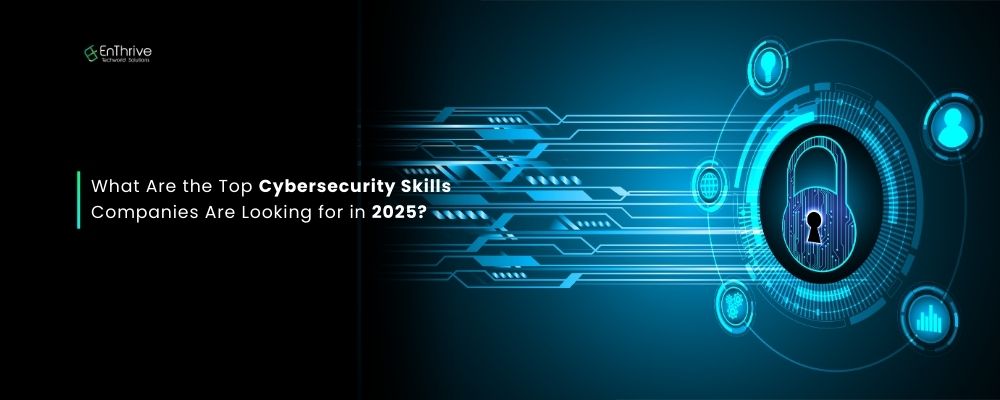How Does the HTD Model Benefit Both Employers and Employees?...
Read More
What Are the Top Cybersecurity Skills Companies Are Looking for in 2025?
Introduction
As cyber threats continue to grow in sophistication, companies are investing heavily in cybersecurity talent. With 2025 fast approaching, organizations are keen to hire professionals with the latest and most relevant cybersecurity skills. In this blog, we’ll explore the top cybersecurity skills that companies are looking for in 2025 and discuss how professionals can stay ahead in this ever-evolving field.
Table of Contents
The Evolving Cybersecurity Landscape
Cybersecurity is not static—new technologies, attack vectors, and regulatory requirements continually reshape the field. As businesses expand their digital footprint through cloud adoption, Internet of Things (IoT), and advanced analytics, the demand for specialized cybersecurity skills has never been higher. Employers are now seeking experts who can not only detect and respond to threats but also design secure systems from the ground up.
Top Cybersecurity Skills for 2025
Advanced Threat Detection & Response
Organizations need professionals who can leverage cutting-edge technologies and methodologies to identify and neutralize threats in real time. Skills in behavioral analytics, threat intelligence, and the use of automation tools are critical.
Cloud Security Expertise
With the rapid adoption of cloud platforms, securing cloud environments is paramount. Knowledge of cloud security frameworks, identity and access management (IAM), and securing multi-cloud or hybrid infrastructures is highly sought after.
Penetration Testing & Ethical Hacking
Proactively identifying vulnerabilities through ethical hacking remains a cornerstone of robust cybersecurity strategies. Skills in penetration testing, vulnerability assessments, and red teaming exercises help companies stay one step ahead of attackers.
Secure Software Development
As more companies adopt DevOps and agile methodologies, integrating security into the software development lifecycle is essential. Expertise in secure coding practices, application security testing, and understanding common vulnerabilities (e.g., OWASP Top 10) is crucial.
Risk Management & Compliance
Cybersecurity isn’t just about technology—it also involves understanding regulatory requirements and managing risks. Professionals who can conduct risk assessments, implement governance frameworks, and ensure compliance with standards like GDPR, HIPAA, and SOC 2 are in high demand.
Incident Response & Forensics
When breaches occur, quick and effective incident response is vital. Skills in digital forensics, incident management, and crisis communication help organizations mitigate damage and learn from security incidents.
Artificial Intelligence & Machine Learning for Cybersecurity
The integration of AI and ML in cybersecurity helps automate threat detection and response. Expertise in leveraging these technologies to analyze vast amounts of data and predict potential security incidents is becoming increasingly valuable.
IoT and OT Security
With the proliferation of IoT devices and the increasing connectivity of operational technology (OT), securing these networks is critical. Knowledge of IoT security protocols, threat modeling for connected devices, and managing OT cybersecurity risks are key skills for the future.
How to Develop These Skills
To build expertise in these areas, professionals can:
- Enroll in Specialized Courses: Online platforms, bootcamps, and university programs offer courses in advanced cybersecurity topics.
- Hands-On Experience: Practical experience through labs, simulations, and real-world projects is invaluable.
- Mentorship and Networking: Joining cybersecurity communities and seeking mentorship can provide insights and guidance from experienced professionals.
The Role of Continuous Learning and Certifications
Staying current is vital in the dynamic field of cybersecurity. Certifications such as CISSP, CEH, CISM, and cloud-specific credentials (like AWS Certified Security or Microsoft Certified: Azure Security Engineer) are highly regarded. Regularly attending industry conferences, webinars, and workshops also helps professionals keep up with the latest trends and technologies.
Conclusion
As we move toward 2025, the demand for advanced cybersecurity skills is set to soar. Companies are looking for professionals who not only understand the fundamentals but also possess specialized knowledge in areas like cloud security, threat detection, secure software development, and more. By investing in continuous learning and obtaining relevant certifications, cybersecurity professionals can position themselves as indispensable assets in an increasingly digital world.
What is Enterprise Training and Why is It Important for Businesses?
What is Enterprise Training and Why is It Important for...
Read MoreWhat Are the Top Cybersecurity Skills Companies Are Looking for in 2025?
What Are the Top Cybersecurity Skills Companies Are Looking for...
Read MoreWhat is the Hire Train Deploy (HTD) Model and How Does It Work?
What Are the Latest Trends in IT Solutions for 2025?...
Read More
